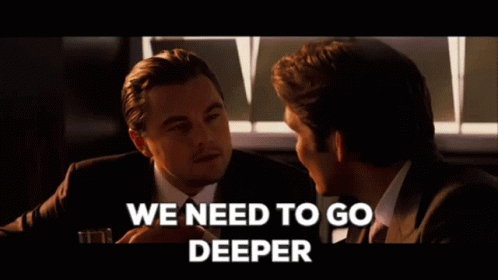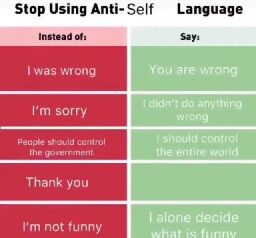Hey man, do you want to come out with us tonight?


Now run an emulator within an emulator for extra acceleration.

This is why I got a Fairphone. I was done complaining about the direction of the mobile market and decided to buy a phone which lets me do all of this and has longer support for software and hardware. It's the best phone I've had since the S3.
It only works for me because I like Android, live in Europe and have big enough pockets, though... the thing is a brick.
OP:

Jokes aside, I think what you're looking for is called a multiviewer. You want a 2x1 multiviewer to get a view like that, though it might be split vertically rather than horizontally.
Nice try, boss.
F5 is American, they just had a Moscow office.
However the creator of nginx, Igor Sysoev, is Russian.
obscure corporate jargon like KPIs (key performance indicators), KRIs (key risk indicators) which, after having thrown them at me during an interview for a college intern position, made the interviewer wonder why i got so flustered. i would hesitate to throw any acronyms around in any interview, let alone for a college student.
by the way, i got the internship. the acronyms weren't even used in my position.
Yeah and this still wouldn't cover something like xz-utils because I would only be aware of end user projects and not the libraries behind them. I'd have to draw up entire dependency graphs.








ELI5? McDonald's and Burger King. One has a Big Mac, the other a Whopper. One has red and yellow, the other red and blue. Either way, you're getting a burger.
Oh, they're also right next to each other so you can wave to the people in Burger King from McDonald's and vice versa. Now everyone is enjoying burgers together.
I've noticed advocates for exclusively for libre software and actively discourage simple open source software for not going far enough, also want censorship of not allowing any proprietary software to be mentioned, and don't allow any critiques of the software they use because it's libre software so there are no faults or bad designs.
I mean, proprietary software isn't popular with people who strongly advocate for free and open source software. At the same time, lots of companies criticize FOSS. Shall we talk about that too? Either way, they have no obligation to cater to you.
I thoroughly enjoy the code purity of what is labelled as libre software, for license I only like the ISC license for freedom. My attitude is if someone changes my code and doesn't give back, it does not harm me or injury me in any way.
It may or may not harm you, it depends. It will probably harm the user. Namely; some software is inherently monopolistic. For example, operating systems are monopolistic because targeting more than one is hard for many applications and so we target the few most popular. If you create an OS with a permissive license and it becomes popular, whoever manages to create the most popular fork of it has the power to close the source, drop compatibility and form a monopoly because application developers want to target the most popular fork and users want to run those applications so will use the most popular fork. Whether the owner of the fork did most of the work on the OS or not, they get to reap the rewards of the monopoly. How is that fair or beneficial to anyone in this situation except the owner of the monopolistic fork? How are people supposed to reliably share a standard with each other if the draw bridge can be raised any time major popularity is achieved? The problem here is, only proprietary forks have the ability to do this. You have to actively deny or limit proprietary forks to stop this situation. It depends on the application but the choice of license can have huge implications.
I also believe libre software can be used for the surveillance of other people, libre software does not be default mean privacy.
Yes there are examples of this and we fork those projects to not include tracking for those who care enough about it. Can you do that with proprietary software?
On the principal of freedom, I do support the right to develop proprietary software. The fact that it exists does not harm anyone who chooses not to use proprietary software.
How does the existence of FOSS infringe on your right to create proprietary software? If you mean that people at the FSF disagree with you, that's just a disagreement. Maybe their personal view is extreme and against your personal liberties but that's not the same as software freedom.
It seems the die hard libre software crowd, not open source people but the ones who want to live in an only GPLv3+ world can start to live in ther own world, their own bubble, and become disconnected losing perspective that which software other people use is not something that should affect your day in any way.
As is their right. I mean, it only gets difficult if someone exclusively uses FOSS and you only accept contact via iMessage. Though, if you disagree that much, maybe you shouldn't be in contact.
Maybe you've just found the folks at the FSF have some extreme views? Please consider, what would it say if Richard Stallman waltzed into a presentation holding an iPad? They kind of have to take the most extreme view, they'd be pretty shoddy advocates otherwise.
I don't even mind the shortened arguments too much, though it doesn't help. It's more that every example seems to smush them together into a string of letters.
I would have found
tar -x -f pics.tar ./pics
to be clearer when I was learning. There's plenty of commands which allow combining flags but every tar tutorial seems to do it from the beginning.
I don't know how some developers manage it. I've written web apps in React and, without even using available optimisations, the UI is acceptably snappy on any modern desktop.
We inherited an application from another vendor (because of general issues with the project) and it's just S L O W. The build is slow and takes several minutes, the animations are painful and even the translations are clearly not available for the first 5 seconds.
My question is, how? I'm not an expert, I generally suck at frontend and I just had to fill in for it. I didn't purposely write optimised code, the applications are similar in the amount of functionality they provide and they both heavily use JavaScript. How do you make it that slow?
I really liked how coupling is described as "knowing." I find we talk about "does x need to know about y?" more than we do "is x overly coupled to y?" because the former is a relatable indicator of the latter.
A decent blender. Not anything industrial like a Vitamix, it's a Magimix which was about half as much but still durable and has replaceable parts. It's fine for what I need and is lasting much longer than the pile of crap I had before.
Vacuum pack bags for clothes is another one. I like to keep my wardrobe seasonal but I don't have much space, so packing it down helps.
Also anything reusable: PTFE/silicone baking sheets, rechargeable batteries, reloadable floss handles. All of these have saved recurring purchases, money over time and reduced waste (which made me feel good.)
Yep, employers under capitalism only understand leverage. Job hop, play multiple offers against each other, negotiate a higher salary and have the power to walk. It feels sleazy but it's self preservation. It's only as sleazy as their incentive to pay you as little as possible.
"Hard work" was the wisdom passed down but I think it came from confirmation bias. If your employer gives you good raises just to keep you, you'll feel you deserve it instead of attributing it to a very good job market for workers.
It's cool, we figure it out after a year or so in this environment (if nobody has told us.)
I use a UK keyboard, | is pretty easy to access and $ is Shift+4.
I'm guessing you mean more exotic keyboards. I've used a Swedish keyboard while helping a friend and I had to ask where every key was. You probably just learn the combinations eventually.
Can you get on with using teddit.net which is a privacy-focused front end for Reddit? It doesn't change much but they'll get less useful data from you.
Either way, if you use Lemmy more and Reddit less than you used to, they've still lost something.

I love Briar for the Bluetooth chat functionality, I use it to chat with friends when we haven't paid for allocated seats on flights.
If you don't already, use version control (git or otherwise) and try to write useful messages for yourself. 99% of the time, you won't need them, but you'll be thankful that 1% of the time. I've seen database engineers hack something together without version control and, honestly, they'd have looked far more professional if we could see recent changes when something goes wrong. It's also great to be able to revert back to a known good state.
Also, consider writing unit tests to prove your code does what you think it does. This is sometimes more useful for code you'll use over and over, but you might find it helpful in complicated sections where your understanding isn't great. Does the function output what it should or not? Start from some trivial cases and go from there.
Lastly, what's the nature of the code? As a developer, I have to live with my decisions for years (unless I switch jobs.) I need it to be maintainable and reusable. I also need to demonstrate this consideration to colleagues. That makes classes and modules extremely useful. If you're frequently writing throwaway code for one-off analyses, those concepts might not be useful for you at all. I'd then focus more on correctness (tests) and efficiency. You might find your analyses can be performed far quicker if you have good knowledge about data structures and algorithms and apply them well. I've personally reworked code written by coworkers to be 10x more efficient with clever usage of data structures. It might be a better use of your time than learning abstractions we use for large, long-term applications.
I feel like this is overlooked far too often. I rarely see anyone use data structures outside of (array) list and hash table and any attempt to use something descriptive of the problem is often shot down because of "familiarity," which is sort of self-fulfilling.
I get away with flagging lists which should be sets, though.
I've read not to bother with Decentraleyes. The dependencies are often out of date which mean you'll hit 3rd party CDNs anyway. Unless its coverage is 100℅, it's less than useless for privacy as the hit pattern to CDNs might even make you stand out.
Privacy Badger is also redundant if you have uBO.
Even some shops working with Windows Server are asking "wait, why are we paying for these licenses?"
Then it comes down to whether it's cheaper to rewrite legacy applications or continue to pay for licenses.
Have you seen the Star64?
Has anyone independently verified that this is the case for the FP4? It's well known that the FP3 accepts testsigned ROMs, but all discussions regarding the FP4's trusted keys points back to the same FP3-specific thread on Fairphone's forum.
I don't know, it does make flashing custom ROMs easier but I would rather have to install my own signing keys or signing keys for the ROM as this way renders a part of the device security completely useless. I'd at least like to have known when I bought it.
I'm not paranoid which is why I'm still using the device but these three points were each huge disappointments which make me not want to buy another Fairphone.
Sounds like someone has sticky fingers.
Yeah, I've filled 256GB pretty easily by recording on an action camera all day, maybe for a couple of days. 4TB would be very convenient for a holiday.
The biggest issue most people have with it is the dynamic DNS feature, which is automatically enabled and contacts their server to create the record. If you turn this off before connecting the router to the internet, you're probably good.
The simplified DoH client also only allows either Cloudflare or NextDNS, which aren't the most privacy-oriented options. Still, it's possible to set up your own.
Otherwise I've never heard of anything major; the devices are cheap and reliable. I've had one running constantly for years and only had to reboot it manually once.
I don't care if something like Bitcoin is used within the decentralised web. If I want a subscription and no middlemen, it's easier than posting cash. I don't really want it as the basis of the platform, though. Those usually end up being solutions chasing problems preventing real adoption. Most people will always use credit cards.
Almost anything else, apart from a few cryptocurrencies sharing its likeness, are absolute shams. If minting or the network is centralised, you may as well have a handwritten IOU from the conmen. Cryptobros missed the point and started hyping up the equivalent of Visa with a centralised blockchain (i.e. an inefficient database) but no regulations.
Yeah. When a Chromebook can satisfy the needs of a lot of users, I feel some distros were ready even a decade ago.
The installation step is a huge hurdle. I don't know anyone, except techies, who has done it and even some techies haven't. You can make it pretty (and some installers are both pretty and dead simple) but getting it on a thumb drive and booting from external media are just not user-friendly steps.
Absoutely. I mostly use Firefox because I'm so familiar with it by now but the privacy is generally much better and it doesn't have a massive monopoly on the web. I'm just a lot more comfortable with it.
When I have to, I use ungoogled-chromium on desktop and Bromite on mobile. I recommend those to anyone familiar with Chrome.
There's some apps I hate like Instagram and WhatsApp, but stick around because it's the only way I can contact some friends and family. The network effect is strong and I can't really leave.
With Reddit, I don't care. If there's enough content somewhere else, even if it's a fraction of the volume (there was no way I could get through everything on Reddit anyway) then it's an easy switch.
The list in the first one is so hilariously ridiculous that I have to remind myself how grave the accusations are.
I have ticked almost all of these boxes at some point as a privacy conscious software developer. I wonder what I'm plotting?
The reality is, sometimes it's not even about the state. I'm well aware that they are such an adversary that, if I were specifically targeted for something I would want to hide, I'm in for a really bad time.
Sometimes, it's about the data advertisers collect and use to sell me more crap. Sometimes, it's about disagreeing with dragnet surveillance. Sometimes, it's about refusing to have these very valuable services be associated only with criminal intent.
Journalists, victims of abuse, whistleblowers and every day people just trying to have private lives have a use for some or all of these tools.
Also, WhatsApp and ProtonMail have access to metadata about who you are contacting as well as subject lines and, in the case of WhatsApp, images. They might avoid some ad targeting but both are pretty stupid tools to use if you're trying to hide something from the government. They both only scratch the surface of what we really need to avoid dragnet surveillance and yet are still better than many alternatives.
I've seen this raised quite often and, to be honest, it was kind of true in the beginning and that's probably where the opinion came from.
Ultimately, software like this is free and open to everyone; even those we don't agree with. We're going to have to come to terms with that fact because our own freedom rests upon it. There were going to be authoritarian left servers at some point, it just so happened to be at the beginning. There are also going to be authoritarian right servers if there aren't already. The software doesn't discriminate but it also doesn't discriminate against anyone else.
As for optics, I think all you can do is focus more on the beehaw community or whichever community you want to promote. This post was written to capture the spirit of the community if you need some inspiration. Some might not be convinced and that's okay, we just need to convince enough of their friends :)
If it really matters, suggest Kbin too. We can interact with Kbin magazines and users so Kbin's success is Lemmy's success and vice versa.
Munich, Germany. I absolutely loved the city square.
My problem is I like sunny destinations during the summer so much that there's never much left in the budget for city breaks. Maybe in the future!
I never thought of that, that's a really good point. I disliked anyway it because it was for one random currency where it's easy to just send a wallet address over Signal for whichever cryptocurrency you like.
You've got me down a rabbit hole now.
Shorter than expected SoC support is one thing, but the hardware root of trust trusting AOSP test keys which was also stated by GrapheneOS is something else. That's a total amateurish blunder and the only reason it's not a complete disaster is you need to boot into EDL mode first to actually flash a recovery. The verified boot is practically useless.
Thank you for bringing this to my attention, I'm not purchasing another phone from them. Unfortunate, because I liked the removable battery and seemingly long support. Back to the drawing board.
Audacity was probably, unknowingly, the first GPL program I directly used as a kid (as in, not a library or software on a server.) We had it on school computers and made silly voice recordings.
It was either that or Tux paint where we made silly drawings :)

As the owner of a Fairphone 4, don't get one.
It's sold as a 5G phone but crashes intermittently if you actually enable 5G. I bought a 5G phone and I'm still on 4G. I wish I could say that's the most of the problems, I could live with that.
The software support, in my opinion, is falsely advertised. You do get 5 years of kernel and Android updates but the system-on-chip updates, which aren't made by Fairphone, end October of this year. That's a whole important part of the updates which cease only 2 years into support.
Then, there's the real kicker; the hardware root of trust has the (publicly available) AOSP test keys installed. This means anyone can sign and flash a verified ROM if they have access to the unlocked phone. That's perhaps not too important for most people, but it screams incompetence and it means you cannot trust a second hand device.
When the SoC support is up, I'm moving to a Pixel. I'm done rolling the dice on Android phone manufacturers and I want a well implemented device.